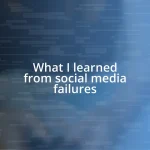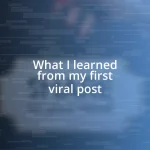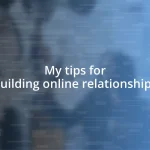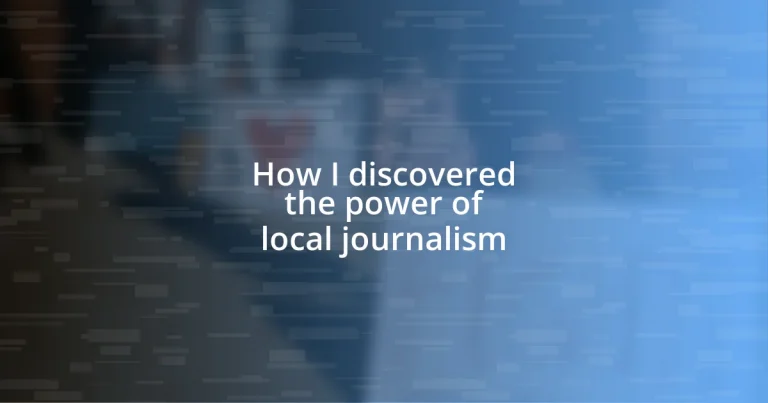Key takeaways:
- Initial skepticism transformed into a deep appreciation for local journalism after witnessing community engagement and realizing the societal relevance of local stories.
- Key experiences highlighted the importance of amplifying local voices, revealing how these narratives foster connections and inspire community action.
- Support for local journalism is crucial for empowering residents and enhancing civic participation, achieved through subscriptions, engagement, and volunteering.
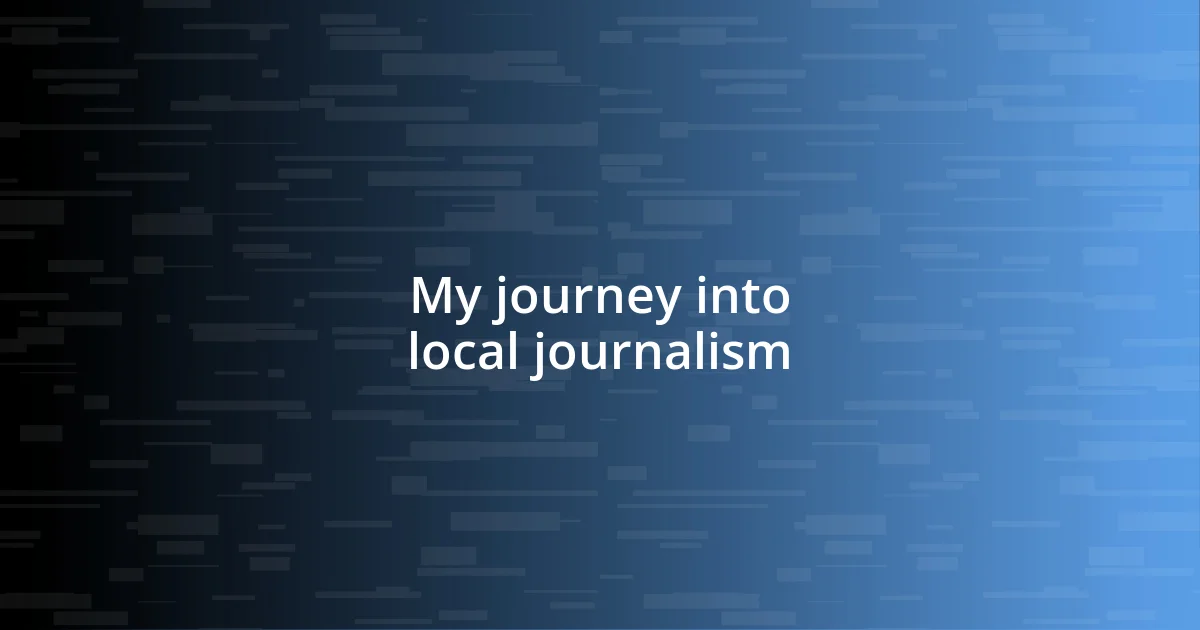
My journey into local journalism
I stumbled into local journalism quite by accident. It all started when I pitched a story about a community garden that was struggling to survive. I had never experienced the thrill of seeing my words come to life in print, and that moment was like a spark that ignited my passion for telling local stories.
As I began covering local events, I found myself deeply connected to my community in ways I never anticipated. Each interview felt like unearthing hidden gems of stories that deserved to be told. I remember chatting with an elderly resident who shared her memories of the town—her voice wavered as she recounted the pride of past festivals. How could I not feel a sense of duty to share her story?
The more I wrote, the more I realized the impact local journalism has on our neighborhoods. I was often left wondering: how many important issues go unnoticed in our towns simply because no one is there to shine a light on them? This realization fueled my drive to delve deeper, reminding me that every story holds power, waiting to resonate with someone who needs to hear it.

Initial skepticism and curiosity
I’ll be honest; my initial stance towards local journalism was a mix of curiosity and skepticism. I often questioned its influence in a world dominated by flashy headlines and trends. Why should I care about the school board meetings or zoning debates? They felt mundane, almost trivial compared to global news stories that seemed to shape our society. Yet, I couldn’t help but wonder—could these local narratives actually carry weight beyond their seeming simplicity?
Once I attended a town hall discussion, that skepticism began to erode. I witnessed firsthand how passionate residents were about the issues that directly impacted their lives. It was illuminating. A mother stood up, voicing concerns over the lack of playgrounds for her children. Honestly, I found myself emotionally invested, realizing that her struggle was a microcosm of larger societal issues—a revelation that sparked an insatiable curiosity within me about local stories waiting to be uncovered.
As I began to explore more, I discovered that beneath the surface of local journalism lay profound connections. I recall meeting a young entrepreneur aiming to revitalize a struggling Main Street. His dreams weren’t just personal; they mirrored the hopes of an entire community. This shift in my perspective drove me to ask: how many unique stories are waiting just outside our front doors, stories that hold power and potential yet remain untold?
| Initial Skepticism | Growing Curiosity |
|---|---|
| Questioned the relevance of local issues | Attended town hall meetings, seeing the passion of residents |
| Thought local stories lacked depth | Realized they reflect broader societal issues |
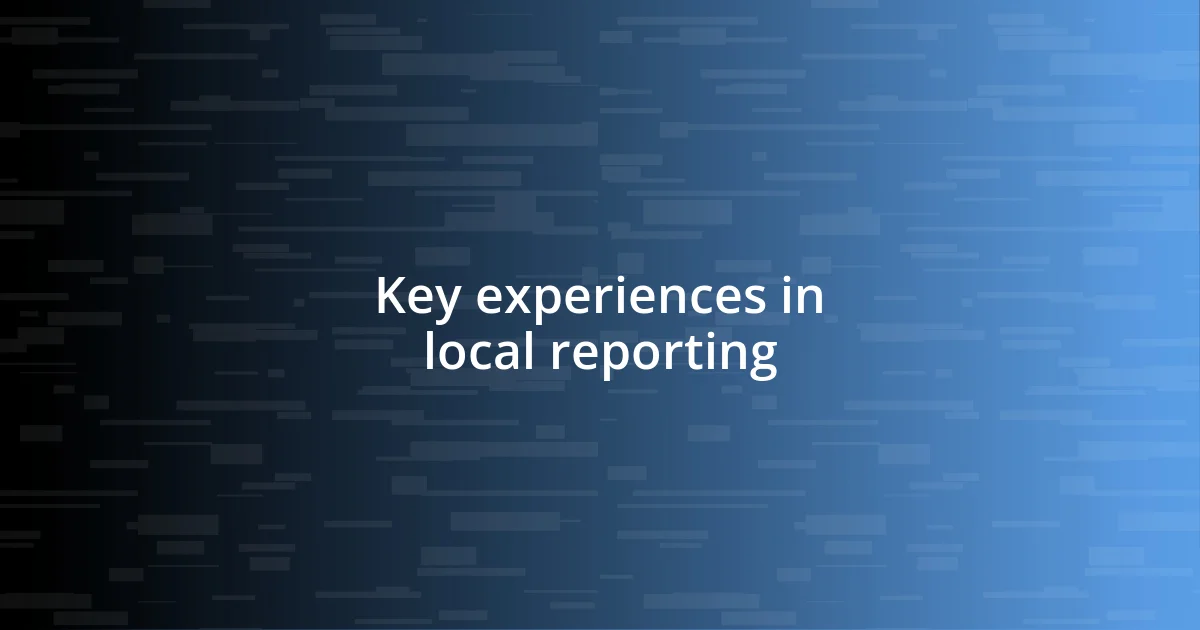
Key experiences in local reporting
It’s often the unexpected moments in local reporting that truly resonate with me. I remember one sunny afternoon at a community festival, a chance encounter led me to meet a local artist whose work celebrated the cultural history of our town. As she spoke about her inspiration, her eyes lit up with passion. I found it awe-inspiring how her artwork reflected the collective memory of our community. That connection showed me the importance of amplifying voices that might otherwise fade into the background.
Key experiences in local reporting include:
- Discovering hidden narratives while shadowing a local history buff who cataloged forgotten stories.
- Interviewing a family who had lived in the area for generations, revealing their hopes and dreams for future generations.
- Engaging with grassroots organizations that tirelessly advocate for environmental changes, showing me the power of local activism.
- Attending neighborhood meetings where community members shared their fears and triumphs, often sparking a chain of reflections on resilience.
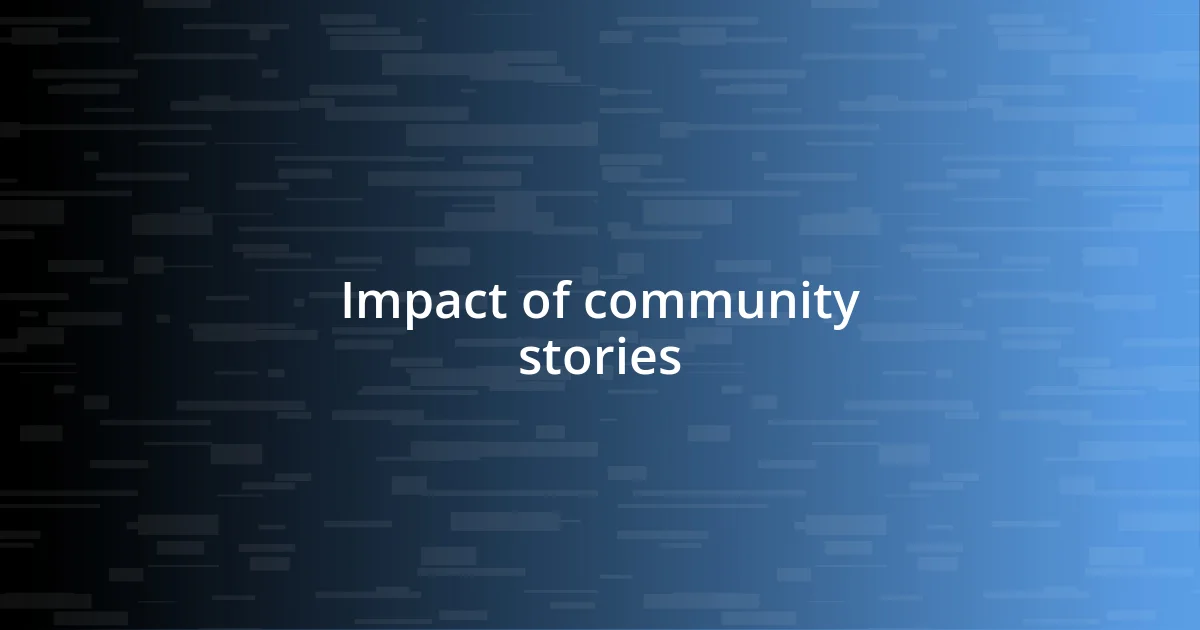
Impact of community stories
Community stories have an undeniable power to foster connection and understanding among residents. I remember a poignant moment during a local veterans’ gathering, where a former serviceman shared his experiences during wartime. As he spoke, the room fell silent, each listener wrapped in his tale. Witnessing the audience’s reaction underscored for me that these narratives create bridges across generations, transforming strangers into neighbors invested in each other’s journeys.
Moreover, I realize that community stories serve as mirrors, reflecting the challenges and triumphs we face together. For instance, during a conversation with local farmers about sustainable practices, I was struck by their passion for preserving the land for future generations. Their stories weren’t just about farming; they were about legacy, responsibility, and hope. How often do we overlook these vital threads in our community fabric that, when interwoven, create a stronger, more resilient society?
Ultimately, it’s these layers of local stories that inspire change through awareness. I recall an investigative piece highlighting a forgotten neighborhood park that had fallen into disrepair. The resulting community outcry revitalized not only the park but also sparked an initiative bringing families together, showcasing how storytelling can rally individuals and ignite collective action. Isn’t it fascinating how a single story can lead to such transformational outcomes?
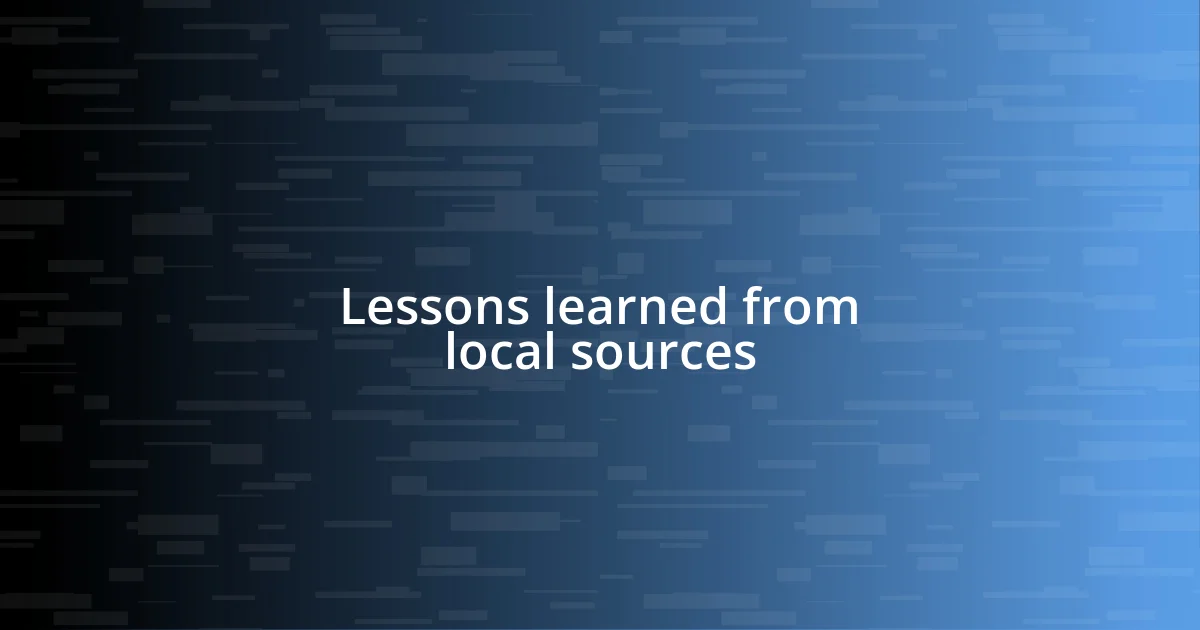
Lessons learned from local sources
One of the most significant lessons I’ve learned from local sources is the value of genuine relationships. During my time covering a local theater group, I was invited backstage to chat with the cast after a performance. Their candid conversations revealed the challenges they faced pursuing their passion, from funding issues to the sheer joy of performing. It made me realize that knowing the people behind the stories adds depth and emotion that enriches the reporting. How can we truly capture a narrative without understanding the heartbeats behind it?
I’ve also come to appreciate how local sources often hold a treasure trove of knowledge that doesn’t make it into the headlines. I once spent an afternoon with a retired teacher who shared stories of the community’s evolution through decades of change. Every tale she told was layered with context that painted a vivid picture of our town’s history. This experience taught me that the most enlightening insights often come from those who have lived and breathed the local experience, rather than mere statistics or facts. Isn’t it remarkable how such personal narratives breathe life into data?
Finally, I learned that local journalism can act as a catalyst for action. After documenting the struggles of a small non-profit struggling to provide services during a crisis, I saw firsthand how sharing their challenges mobilized support throughout the community. Donations poured in, and volunteers stepped up. It struck me that local stories not only inform but can ignite a spark that transforms inaction into tangible results. How powerful is it to understand that our words can inspire others to come together for a cause?
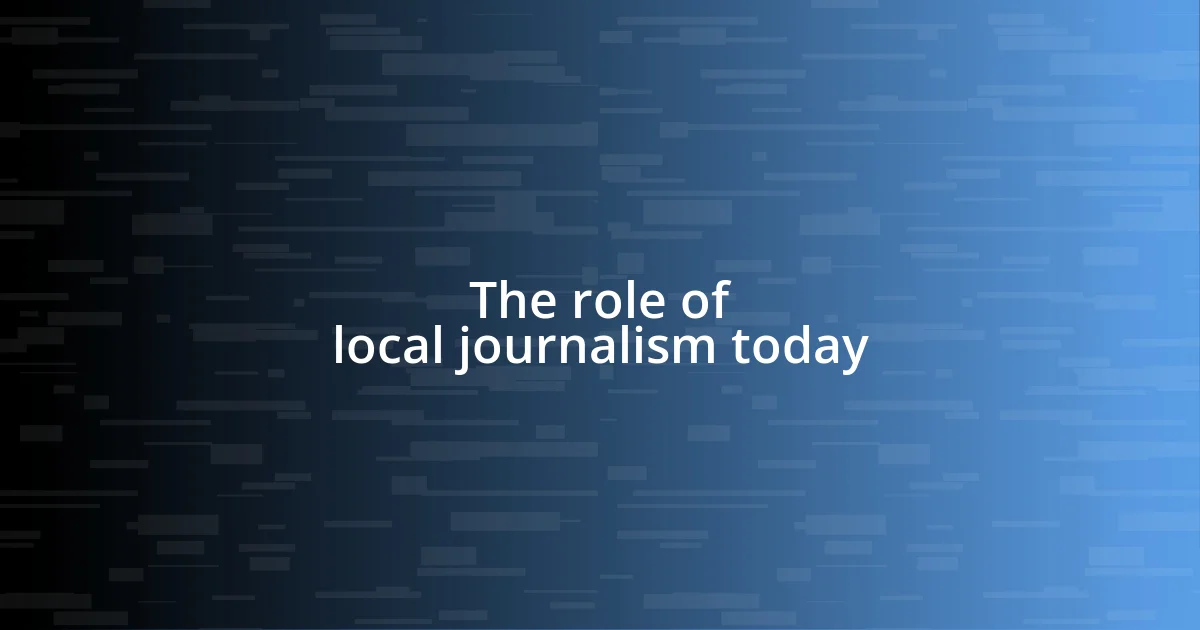
The role of local journalism today
Local journalism plays a vital role today as a trusted source of information within communities. I often think back to when I reported on a local election. The debates and town hall meetings weren’t just about candidates; they became forums where residents voiced concerns and aspirations. Observing the engagement among neighbors made me realize how local journalism connects citizens to the democratic process, fostering civic participation in a way national media often overlooks.
As we navigate complex issues like public health and education, local reporting becomes crucial. I recall covering a story about funding cuts to our local school district. Parents and teachers rallied to raise awareness, and as I spoke with them, it was clear that local journalism provided a platform for their voices. This engagement didn’t merely inform; it empowered them to advocate for change. Isn’t it fascinating how grassroots efforts can flourish when they’re supported by dedicated local reporting?
Moreover, local journalism acts as a watchdog, ensuring accountability from local authorities. I remember attending a city council meeting after a controversial zoning decision. The tension in the room was palpable as community members expressed their concerns. I felt a sense of duty to convey their stories accurately, holding decision-makers accountable in a way that larger outlets couldn’t. This experience reaffirmed for me that local journalists have the unique power to amplify community voices and drive transparency. Isn’t that what journalism should always strive to achieve?
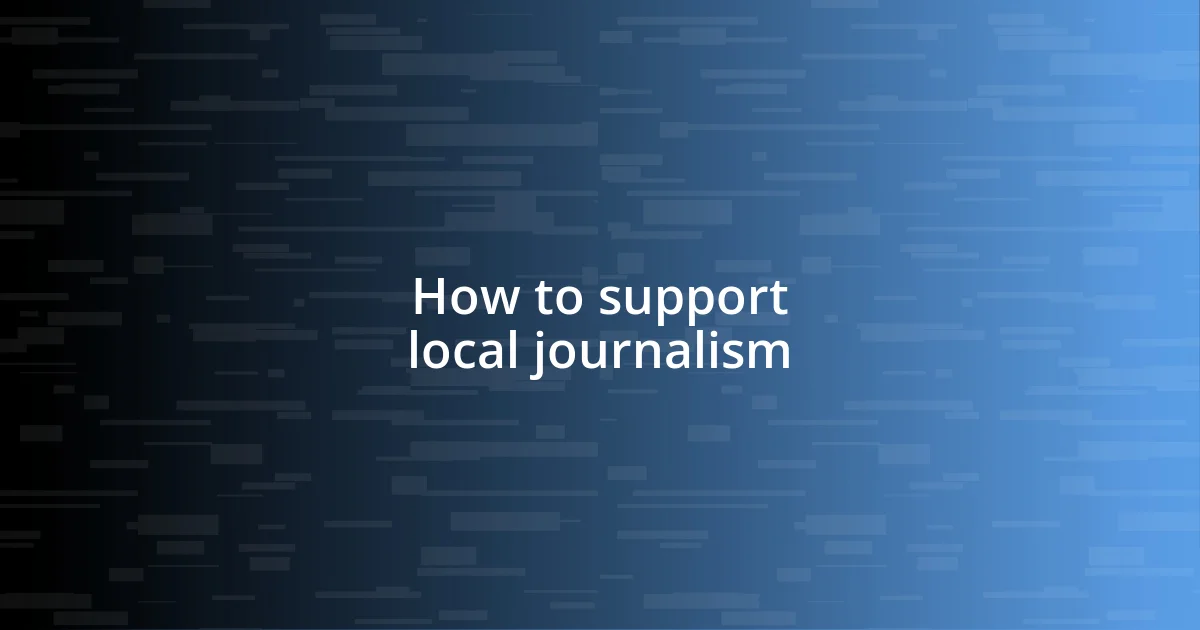
How to support local journalism
Supporting local journalism can take many forms, and one of the most straightforward ways is by subscribing to local publications. I remember the moment I signed up for my community’s newsletter; it felt like I was gaining a new friend who would keep me in the loop. Subscriptions not only provide financial support but also show publishers that there’s an audience hungry for local stories. Have you ever thought about how your subscription can help sustain trustworthy reporting in your area?
Another powerful way to support local journalism is by engaging with it—commenting on articles, sharing stories on social media, and attending local events. When I shared a particularly moving piece about our town’s volunteer fire department, the responses were overwhelming. People connected over shared memories and experiences, highlighting the importance of those narratives. Isn’t it amazing how our voices can amplify local stories, turning individual accounts into a community conversation?
Moreover, I believe that volunteering your time and skills can make a significant difference. During a particularly challenging time for my local paper, I offered to help with community outreach. Seeing firsthand how appreciated even a few hours of my time could be was enlightening. It showed me that, whether it’s organizing events or providing copy-editing support, our contributions bolster the very fabric of local journalism. Have you considered how your unique skills might lend a helping hand in your community?




